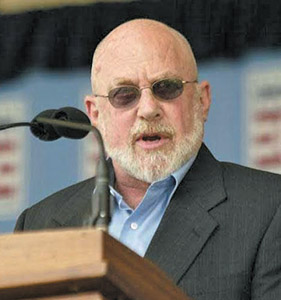
While growing up in Pittsburgh in the 1940’s and 50’s, Murray Chass’ favorite baseball player was a seldom used bench player named Ted Beard.
The reason Chass loved him was simple: he was, like himself, small and left handed. Chass’ insights and observations into baseball grew over the years. He would go on to become The New York Times’ national baseball reporter, and have his photograph and biography included in the sportswriters and announcers wing of Major League Baseball’s Hall of Fame.
Chass loved baseball early on in his life, having been indoctrinated into the sport by his parents, who were big baseball fans. His home team Pittsburgh Pirates of the 1940s and 50s never made the post season and had arguably the worst team in MLB history in 1952 (42-112). That didn’t deter Chass. “I played baseball all the time,” said Chass. He was one of the members of the initial Little League Team in his neighborhood. “I wasn’t great, but I was competitive,” said Chass.
Writing was where Chass found his talent. Upon graduating from the University of Pittsburgh, he worked for the Associated Press in Pittsburgh. While working at AP, Chass covered the State Supreme Court. For this coverage, Chass learned about legal issues and terminology. “This taught me how to be a reporter and made me well rounded.”
Chass joined the New York Times in 1969, and moved to Bergen County. He covered the Yankees from 1970-1986. This was a particularly turbulent time for the Yankees. It marked the beginning of the George Steinbrenner era. There was regular drama between Steinbrenner, Billy Martin and Reggie Jackson. Chass fondly recalls one of his favorite quotes. “While getting on a plane to Kansas City, Billy said to me about Steinbrenner and Jackson, ‘The two of them deserve each other; one’s a born liar, the other’s convicted.’”
The next morning Billy resigned. Chass said the era was a fun and interesting time and provided a great deal of work for a reporter.
“There were players I enjoyed covering and talking to and others who I had no interest in talking to,” said Chass. Graig Nettles was the latter. After unleashing a stream of obscene comments at Chass, the two stopped talking. Overall, Chass said, “There were more decent guys.” He lists Mickey Rivers, Thurman Munson, and Bob Tewksberry as examples of players he enjoyed covering.
While Chass had players he liked, he was not a fan of the team. He said he believes a reporter can’t root for a team and do a professional objective job. “I’ve always had high standards, and being a professional is the most important thing,” said Chass. He is, however, a fan of the game.
Chass describes himself as a reporter who covered baseball but not a baseball writer. He says about covering sports, “Much is handed to you. You cover the game, and you talk to players. You see what happens on field and that is mainly what you write about.” Chass tried to be different, “One thing that set me apart is I went beyond what was on the field, which enabled me to be more of a reporter.” Because of this desire and interest, Chass broke new ground in covering topics such as labor and player contracts.
While Chass retired from The New York Times, he still follows baseball and maintains a blog (http://www.murraychass.com/) where he writes about baseball. Regarding the upcoming year, he is not optimistic about the locals. He says of the Mets, “They’re getting a lot of attention for pitching. However, even good pitchers need run support.”
Chass projects the Mets competing with the Marlins for second place behind the Nationals who he counts as one of the best teams going into the season. He is even less optimistic about the Yankees. “They have too many question marks. I don’t see them doing anything good.” Chass predicts a 4th or 5th place finish for the Yanks.
Like many others, Chass is curious about A-Rod. A big fan when he first interviewed him, Chass said “A-Rod is a huge disappointment, who conned people and made himself out to be something he wasn’t.” Being out for a year, his advanced age, and past injuries will make returning a challenge for A-Rod though Chass says if he were manager, he would give him every chance to show he can play as the team is short on offense.
Chass grew up in an Orthodox home, and has always maintained a kosher diet. In Fair Lawn, his current home, he enjoys the proximity to the city and the good kosher restaurants in Teaneck. Observance was a challenge while covering the Yankees. He never worked on Rosh HaShana and Yom Kippur. “Every road trip I made was a problem, but I managed,” he concludes.
By Larry Bernstein








